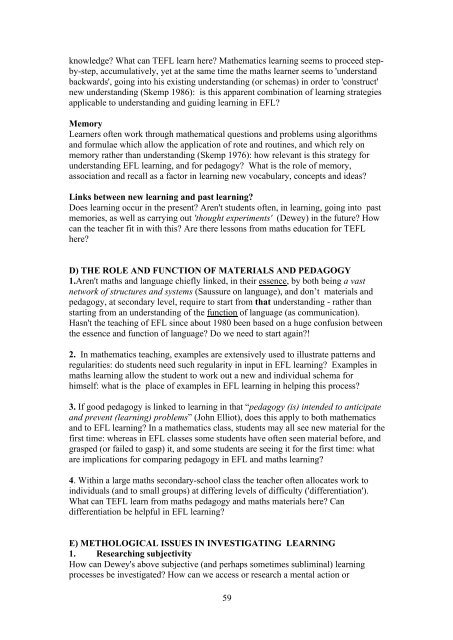RADICAL TEFL
2hqhXJd
2hqhXJd
Create successful ePaper yourself
Turn your PDF publications into a flip-book with our unique Google optimized e-Paper software.
knowledge? What can <strong>TEFL</strong> learn here? Mathematics learning seems to proceed stepby-step,<br />
accumulatively, yet at the same time the maths learner seems to 'understand<br />
backwards', going into his existing understanding (or schemas) in order to 'construct'<br />
new understanding (Skemp 1986): is this apparent combination of learning strategies<br />
applicable to understanding and guiding learning in EFL?<br />
Memory<br />
Learners often work through mathematical questions and problems using algorithms<br />
and formulae which allow the application of rote and routines, and which rely on<br />
memory rather than understanding (Skemp 1976): how relevant is this strategy for<br />
understanding EFL learning, and for pedagogy? What is the role of memory,<br />
association and recall as a factor in learning new vocabulary, concepts and ideas?<br />
Links between new learning and past learning?<br />
Does learning occur in the present? Aren't students often, in learning, going into past<br />
memories, as well as carrying out 'thought experiments' (Dewey) in the future? How<br />
can the teacher fit in with this? Are there lessons from maths education for <strong>TEFL</strong><br />
here?<br />
D) THE ROLE AND FUNCTION OF MATERIALS AND PEDAGOGY<br />
1.Aren't maths and language chiefly linked, in their essence, by both being a vast<br />
network of structures and systems (Saussure on language), and don’t materials and<br />
pedagogy, at secondary level, require to start from that understanding - rather than<br />
starting from an understanding of the function of language (as communication).<br />
Hasn't the teaching of EFL since about 1980 been based on a huge confusion between<br />
the essence and function of language? Do we need to start again?!<br />
2. In mathematics teaching, examples are extensively used to illustrate patterns and<br />
regularities: do students need such regularity in input in EFL learning? Examples in<br />
maths learning allow the student to work out a new and individual schema for<br />
himself: what is the place of examples in EFL learning in helping this process?<br />
3. If good pedagogy is linked to learning in that “pedagogy (is) intended to anticipate<br />
and prevent (learning) problems” (John Elliot), does this apply to both mathematics<br />
and to EFL learning? In a mathematics class, students may all see new material for the<br />
first time: whereas in EFL classes some students have often seen material before, and<br />
grasped (or failed to gasp) it, and some students are seeing it for the first time: what<br />
are implications for comparing pedagogy in EFL and maths learning?<br />
4. Within a large maths secondary-school class the teacher often allocates work to<br />
individuals (and to small groups) at differing levels of difficulty ('differentiation').<br />
What can <strong>TEFL</strong> learn from maths pedagogy and maths materials here? Can<br />
differentiation be helpful in EFL learning?<br />
E) METHOLOGICAL ISSUES IN INVESTIGATING LEARNING<br />
1. Researching subjectivity<br />
How can Dewey's above subjective (and perhaps sometimes subliminal) learning<br />
processes be investigated? How can we access or research a mental action or<br />
59


